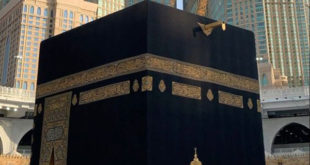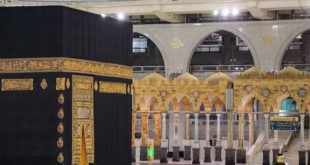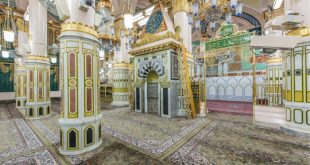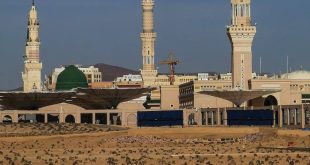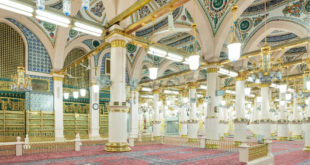عن جابر بن عبد الله أنه سمع النبي صلى الله عليه وسلم يقول إذا دخل الرجل بيته فذكر الله عند دخوله وعند طعامه قال الشيطان لا مبيت لكم ولا عشاء وإذا دخل فلم يذكر الله عند دخوله قال الشيطان أدركتم المبيت وإذا لم يذكر الله عند طعامه قال أدركتم المبيت …
Read More »Recent Posts
October, 2015
-
21 October
Reasons for our Dawat not being Effective – Part 1
One of the reasons why the da’wat nowadays is not effective is the abundance of haraam we are involved in. It won’t be an exaggeration if it is said that 70 to 80 percent of people engage in indecent works (including porn etc.). It brings you to a level when …
Read More » -
20 October
The Exalted Position of the Sunnah
وعن ابن مسعود رضي الله عنه قال الاقتصاد في السنة أحسن من الاجتهاد في البدعة. رواه الحاكم موقوفا وقال إسناده صحيح على شرطهما (الترغيب والترهيب 1/98) Hadhrat Abdullah bin Mas’ood (Radhiyallahu Anhu) is reported to have said: “Adopting moderation in practising upon the sunnah is better than striving and exerting …
Read More » -
19 October
The Serious consequences of abandoning purdah
Hazrat Moulana Ashraf Ali Thanwi (rahmatullahi ‘alaih) once mentioned: The non-observance of purdah has, nowadays, become rampant and rife in every place. The era we are living in is an era of great fitnahs and trials. Some people raise an objection against the law of purdah. They claim that through …
Read More » -
17 October
The Habit of Umar Ibn Abdul Aziz (Rahmatullahi Alaih)
A Hadith says: "When two third of the night passed, Rasulullah (Sallallahu Alaihi Wasallam) said, “O people, remember Allah! Remember Allah! The quake of Doomsday will soon occur! The time for the blowing of the Trumpet (Soor) is drawing near! And everybody's hour of death, along with its pangs and …
Read More »
-
The Brother-in-law of Rasulullah (sallallahu ‘alaihi wasallam)
Hazrat Talhah (radhiyallahu ‘anhu) was married to four wives. Each of his four wives was …
Read More » -
The Compass of the Hearts of the Sahaabah (radhiyallahu ‘anhum) – The Tolerance of Rasulullah (sallallahu ‘alaihi wasallam) – The Orchards of Love – Part Seventy Four
-
Tafseer of Surah Naazi’aat
-
The Extreme Generosity of Hazrat Talhah (radhiyallahu ‘anhu)
-
Securing the Blessings of Ramadhaan, Umrah and Hajj – The Tolerance of Rasulullah (sallallahu ‘alaihi wasallam) – The Orchards of Love – Part Seventy Three
-
Receiving Seventy Rewards
Hazrat Abdullah bin Amr bin Aas (radhiyallahu ‘anhuma) reported, “Whoever sends salutations upon Nabi (sallallahu ‘alaihi wasallam) once, Allah Ta‘ala and His angels will send seventy mercies and blessings upon him in return of his one Durood. Hence, whoever wishes to increase his Durood should increase it, and whoever wishes to decrease his Durood should decrease it (i.e. if he wants to earn great rewards, then he should increase his Durood).”
Read More » -
Increase in Sustenance
-
The Reward of Fasting on the Day of Arafah
-
The Angel that Stands at the Blessed Grave of Hazrat Rasulullah (sallallahu ‘alaihi wasallam) to Convey the Durood of the Ummah
-
Reciting Durood when Entering the Musjid
-
Sunnats and Aadaab of the Host – 3
3. Generosity and feeding the creation was a salient quality and attribute of all the …
Read More » -
Sunnats and Aadaab of the Host – 2
-
Sunnats and Aadaab of the Host – 1
-
Sunnats and Aadaab which every person needs to adhere to in his individual life – 9
-
Sunnats and Aadaab which every person needs to adhere to in his individual life – 8
-
Hazrat Ali (radhiyallahu ‘anhu) – Part Forty-One – Being Sent by Rasulullah (sallallahu ‘alaihi wasallam) to Level the Graves, Destroy Idols and Erase Pictures
Hazrat Ali (radhiyallahu ‘anhu) reports that on one occasion, Rasulullah (sallallahu ‘alaihi wasallam) attended a …
Read More » -
Rasulullah (sallallahu ‘alaihi wasallam) Approving of the Verdict of Hazrat Ali (radhiyallahu ‘anhu) – Part Forty
-
The True Ulamaa – Hazrat Ali (radhiyallahu ‘anhu) – Part Thirty Nine
-
Du‘aa for Assistance in Settling Debts – Hazrat Ali (radhiyallahu ‘anhu) – Part Thirty Eight
-
The Concern of Hazrat Ali (radhiyallahu ‘anhu) regarding Business being Conducted According to the Islamic Principles – Part Thirty Seven
 Ihyaaud Deen An Effort to Revive Deen in Totality
Ihyaaud Deen An Effort to Revive Deen in Totality






















































